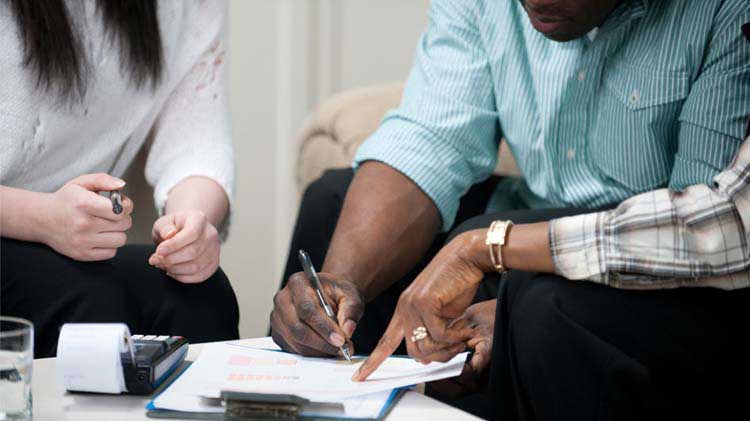Signing a lease: What you need to know
When signing a lease, it’s important to prepare, understand your lease agreement, and ask the right questions of your landlord.
After you've decided to rent and found your perfect apartment, it's tempting to quickly sign the rental agreement and move in. However, it’s important to consider all factors when signing a lease and fully understand your lease agreement.
Before you sign
Before signing your lease, prepare all the essentials that you or your landlord might need to successfully sign a lease.
Check your credit score
Request a credit report. Landlords and leasing agents use a potential tenant's credit to make sure they have a positive history of paying bills and paying them on time. By knowing in advance if there are any items of concern, you have an opportunity to fix them or talk to the landlord in advance about them.
Review deposits and fees
Deposits and fees can sometimes get tricky if they haven't been discussed thoroughly with your landlord before signing a lease. Knowing all the ins and outs of the security deposit and any additional fees of your rental can help make you feel much more at ease.
Get a renters insurance quote
Want to protect your stuff?
Provide references
Many landlords require a list of references to screen potential tenants. This could include previous landlords, employers, friends, coworkers or college professors. Find people who will speak positively about you and are willing to be contacted. When offering references, make sure to include their name, phone number, address, and an email address.
Be ready with financials
Oftentimes, landlords request proof of employment so they are confident you can pay your rent. You may have to provide bank account information — so have your account numbers handy. Plan ahead in case you need to make a payment to hold a rental.
Signing a lease
Once you are ready to sign, it is important to read the lease agreement very carefully. This is the time when you can negotiate, ask any last questions, and agree to your landlord’s terms.
As you are signing, pay special attention to the proposed move in date. Try to sign the lease as close as possible to your preferred move in date or request the start of the lease to begin just before or the day you move in.
Some leases begin as soon as you sign it, and your landlord wants the new tenant to sign the lease as close as possible to the date the previous tenant vacates. Others delay the move in date since the property needs repairs and cleaning.
After you sign
A lease is a binding contract between the landlord and the tenant once it has been signed, and changes made by either party could have a negative impact. However, an addition could be added that would be signed by the landlord and the tenant if both parties agree that changes are needed.
Can you back out of a lease before it starts?
While not encouraged, it is possible to back out of a lease before it starts. However, there are usually consequences. Many landlords will collect early termination fees, take a portion (or all) of your security deposit, or require you to pay a portion of your rent.
Some leases may include a set number of days after signing the lease in which either party may cancel the lease. Be sure you read the lease before signing and ask your landlord questions, so you know what you are committing to.
Can a landlord change the lease after it is signed?
Generally speaking, the answer is no. It is considered unethical for a landlord to change a lease after it is signed. Most of the time, landlords will make changes during a lease renewal and voice their changes to you before you re-sign. Before you renew your lease agreement, make sure to read through your contract and look for any changes your landlord may have made.
Landlords typically offer rental renewal agreements on a case-by-case basis. They may ask if you want to renew around 90 days before your current rental agreement expires. Some landlords have an automatic renewal clause, which they should make you aware of in advance.
Questions to ask when renting an apartment
Signing a lease agreement is a big deal, and it’s important to understand what you are signing up for. Here are some questions to ask when renting an apartment.
- How is the property managed? It should be clear who the property manager and the landlord are, and it’s important to understand who to contact for maintenance or rent-related concerns.
- Is renters insurance required? It’s not un-common for landlords to ask renters to purchase and maintain renters insurance . Before you sign, know what they expect of you and your insurance company.
- How much notice will you give me before entering my unit? Rental agreements may have a Right of Entry clause, which states what will happen when your landlord needs to enter your unit. Understanding the rules in place helps you know what to expect when a situation arises.
- Are pets allowed? If you have a pet, or plan to get one, you need to know if they are allowed. Furthermore, if your landlord allows pets, it typically indicates there will be other residents in your building with them.
- Are there noise restriction rules? A common renter complaint is having to deal with noisy neighbors. Rental agreements may have a clause that prohibits noise past a certain hour, so make sure you understand the rules regarding disruptive behavior.
- What is the length of the rental agreement? Double-check the duration of your rental agreement. Never assume that yours is the standard 12-months.
- What should I expect towards the end of my rental agreement? Sometimes landlords automatically increase rent by a certain amount towards the end of a rental agreement. In this case, you should know the increase before considering a rental agreement renewal.
After you sign your lease and move into your new home, remember that your rental is still the landlord's property. Whether you’re a seasoned or new renter, find out how to keep your rental in tip top shape. You can get a renters insurance quote now, or give us a few details and a State Farm® agent will reach out to you.
The information in this article was obtained from various sources not associated with State Farm® (including State Farm Mutual Automobile Insurance Company and its subsidiaries and affiliates). While we believe it to be reliable and accurate, we do not warrant the accuracy or reliability of the information. State Farm is not responsible for, and does not endorse or approve, either implicitly or explicitly, the content of any third-party sites that might be hyperlinked from this page. The information is not intended to replace manuals, instructions or information provided by a manufacturer or the advice of a qualified professional, or to affect coverage under any applicable insurance policy. These suggestions are not a complete list of every loss control measure. State Farm makes no guarantees of results from use of this information.
Neither State Farm nor its agents provide tax or legal advice.
State Farm Fire and Casualty Company
State Farm General Insurance Company
Bloomington, IL
State Farm Florida Insurance Company
Tallahassee, FL
State Farm Lloyds
Richardson, TX




